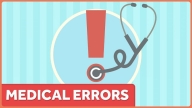المدونة القانونية
The Difference Between Medical Error and Gross Medical Error under UAE Law

Medical malpractice cases are among the most sensitive legal issues, as they directly affect human life and health. For this reason, the UAE legislator enacted Federal Decree-Law No. (4) of 2016 on Medical Liability, and its Executive Regulations, to set clear rules and standards governing the liability of healthcare professionals and medical establishments.
One of the key distinctions made under this law is between medical error and gross medical error, as each carries different legal consequences.
1. Definition of Medical Error – Article (6) of the Law
Article (6):
“A medical error is an error committed by the practitioner of the profession for any of the following reasons:
1. His ignorance of the technical issues that every practitioner of the profession of the same degree and specialization is supposed to be aware of.
2. Failure to follow the recognized professional and medical standards.
3. Failure to act with necessary due diligence.
4. Negligence and failure to act carefully and with precaution.
The Executive Regulations of this Decree-Law shall set the standards of gross medical errors.”
This article makes clear that a medical error arises when a practitioner breaches the duty of care due to ignorance, failure to follow medical standards, or negligence.
2. Definition of Gross Medical Error – Article (5) of the Executive Regulations
Article (5) of the Executive Regulations:
“A medical error shall be deemed gross if it results in the death of a patient or fetus, the wrongful removal of an organ, the loss of function of an organ, or any other serious harm, in addition to the occurrence of one of the following circumstances:
a. Gross ignorance of the recognized medical principles relevant to the practitioner’s degree and specialty.
b. Following a medical method that is not professionally recognized.
c. An unjustified deviation from medical principles and rules in practice.
d. Practicing under the influence of alcohol, anesthesia, or a psychotropic substance.
e. Gross negligence or clear lack of foresight in carrying out recognized medical procedures, such as leaving instruments inside the patient’s body, administering an overdose, failing to operate medical equipment during or after surgery, resuscitation, or childbirth, failing to administer appropriate medication, or any other act that amounts to gross negligence.
f. Deliberately practicing outside the scope of specialization or clinical privileges granted under the practitioner’s license.
g. Using diagnostic or therapeutic methods without prior training or experience, and without medical supervision.”
Additionally, the article requires the competent committee and the Higher Committee to review complaints and appeals related to medical errors and to determine:
• The standard applied in classifying the act as a gross medical error.
• The elements available in the case file confirming the existence of gross medical error.
• The type of harm and error caused.
3. Key Differences Between Medical Error and Gross Medical Error
| Element | Medical Error | Gross Medical Error |
| Legal Basis | Article (6) of the Law | Article (5) of the Executive Regulations |
| Degree of Fault | Negligence, ignorance, or limited deviation | Gross ignorance, severe negligence, or grave deviation |
| Consequences | May cause harm, but generally reparable or compensable | Death, loss of organ or function, or other irreversible serious harm |
| Liability | Primarily civil, with some criminal aspect | Both civil and aggravated criminal liability |
| Assessment | Evaluated by medical committees and courts | Mandatory committee assessment to establish grossness |
4. Importance of the Distinction
The distinction between medical error and gross medical error is fundamental:
• It defines whether liability is civil or criminal.
• It influences the amount of compensation and the severity of penalties.
• It balances the protection of patients’ rights with fairness toward healthcare professionals.
Written by:
Ismail Salman | ISN Legal Consultancy

هذا المنشور لعرض المعلومات العامة فقط، ولا يهدف لتقديم استشارة قانونية شاملة أو أي نوع آخر من الاستشارات.
لا تتحمل شركة ليجال أدفايس ميدل إيست والمساهمون مسؤولية أي خسائر قد تنجم عن الاعتماد على المعلومات المذكورة في هذا المنشور. هذا المنشور يهدف فقط إلى الإشارة إلى المسائل القانونية التي تحتاج إلى طلب الاستشارة بشأنها.
لا بد من الحصول على استشارة قانونية شاملة في الوقت المناسب من خلال محامٍ كفء عند التعامل مع مواقف معينة.


